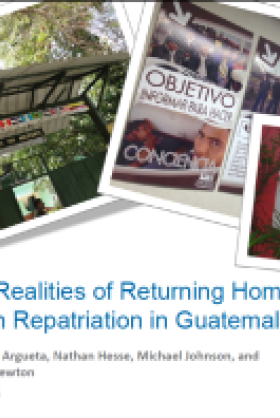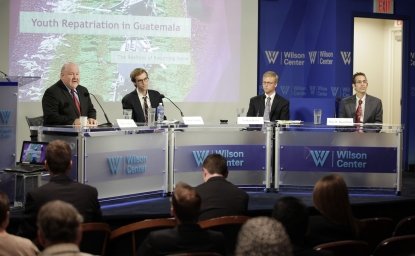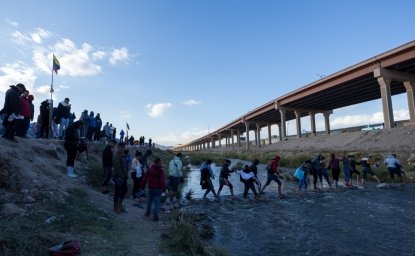The Realities of Returning Home: Youth Repatriation in Guatemala


The paper is available for download below.
The Realities of Returning Home: Youth Repatriation in Guatemala
Alejandra Argueta, graduate researcher, GWU
Nathan Hesse, graduate researcher, GWU
Michael Johnson, graduate researcher, GWU
Warren Newton, graduate researcher, GWU
In the summer of 2014, record numbers of migrants from Central American countries, many of them unaccompanied minors, were intercepted at the U.S.-Mexico border. In the United States, much of the debate in the media and in Congress focused on how to process and return these migrants to their countries of origin—but what happens to these migrants after they are returned? This report provides a brief background on the contemporary socioeconomic issues facing the countries of the Northern Triangle, particularly Guatemala. The study examines the repatriation of Guatemalan migrants, both in practice and theory, and concludes with a series of policy recommendations for Guatemalan civil society and government to improve repatriation policies and practice. The authors chose Guatemala as the focus of this report because of the country’s initial lead on repatriation services as compared to its neighbors, evidenced by investments and programs instituted by organizations such as Kids in Need of Defense (KIND) and the International Organization on Migration (IOM).
This research initiative is the culmination of the authors’ Master’s Capstone Project conducted during the spring of 2015. As graduate students at the George Washington University’s Elliott School of International Affairs, the researchers partnered with the Latin American Program at the Woodrow Wilson International Center for Scholars to carry out research and present a report on youth repatriation in Guatemala. Fieldwork and research was carried out to answer the question: What happens to repatriated Guatemalan migrant youth after they are returned? The authors traveled to both Guatemala City and Quetzaltenango for two weeks to interview Guatemalan government agencies and civil society that work with repatriated migrants. A critical goal was to include a wide perspective on youth repatriation, encompassing different demographics and organizations.
Read the full report below.
Authors
Contributors

Latin America Program
The Wilson Center’s prestigious Latin America Program provides non-partisan expertise to a broad community of decision makers in the United States and Latin America on critical policy issues facing the Hemisphere. The Program provides insightful and actionable research for policymakers, private sector leaders, journalists, and public intellectuals in the United States and Latin America. To bridge the gap between scholarship and policy action, it fosters new inquiry, sponsors high-level public and private meetings among multiple stakeholders, and explores policy options to improve outcomes for citizens throughout the Americas. Drawing on the Wilson Center’s strength as the nation’s key non-partisan policy forum, the Program serves as a trusted source of analysis and a vital point of contact between the worlds of scholarship and action. Read more




